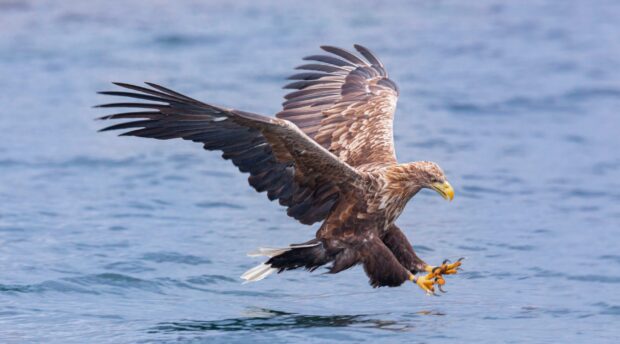Sheep producers who have lost livestock to sea-eagles will continue to receive support for 2024 but the industry is calling for improvements in the scheme to avoid any “unnecessary” delays in the future.
The announcement was only made this week after Scottish farmers and crofters were still left waiting to receive contracts for this year’s Sea Eagle Management Scheme (SEMS).
It reached a stage where many of those affected by the birds of prey, particularly in the west, were well through lambing when damage had already been done this year.
The Scottish Government says up to £400,000 has been allocated to the Sea Eagle Management Scheme (SEMS) to help farmers explore different management techniques and trial new prevention measures.
Those in receipt of financial support through long-term management agreements as part of the scheme have been assured payments will continue this year.
Farmers can receive between £500 up to £5,000 to help manage the effects of the species as part of SEMS.
Argyll hill farmer David Colthart, who is chair of Argyll and Lochaber Sea Eagle Stakeholder group welcomed the news.
He said improvements were needed in the scheme for 2025 to avoid any unnecessary delays in the future.
“In recent days, NFU Scotland president Martin Kennedy has spoken privately with Cabinet Secretary Mairi Gougeon on the release of funding and Agriculture Minister Jim Fairlie has been in contact with myself,” said Mr Colthart.
“It’s very good news that Scottish Government officials have finally allowed NatureScot to issue contracts to more than 200 farmers and crofters that have been impacted by White-tailed Eagle predation on their livestock.
“With eagles already actively predating lambs in lambing parks, the funding for mitigation measures and management will be a relief.”
However, Mr Colthart said it was “disappointing” that lambing was already in full swing when confirmation that scheme commitments would be funded.
“As the current scheme is being reviewed for 2025, it has highlighted the importance of making appropriate changes to the scheme to reflect the increased costs to businesses of WTE predation and the need for the timely release of contracts ahead of lambing starting being guaranteed in the future.”
Agriculture Minister Jim Fairlie said he had spoken to many farmers who have experienced disruptive attacks.
“They (farmers and crofters) have expressed their frustrations and I fully understand both the mental and financial toll that eagle attacks are having on them and their businesses,” said Mr Fairlie.
“I hope this news provides some much needed reassurance for farmers.”
A spokesperson for NatureScot said: “NatureScot and the Scottish Government recognise that white-tailed eagles can cause economic impacts to farms and crofts in some locations.
“We are committed to provide continued support to farmers and crofters through the Sea Eagle Management Scheme, especially for those suffering the greatest impacts.”
